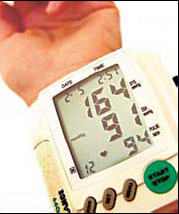Life
In brief
(China Daily)
Updated: 2011-01-19 07:55
 |
Large Medium Small |
Protein find may help fight arthritis
Scientists have found a protein that acts as a "master switch" to determine whether certain white blood cells will boost or dampen inflammation, a finding that may help the search for new drugs for rheumatoid arthritis.
Many patients with rheumatoid arthritis are treated with a class of drugs known as tumor necrosis factor (TNF) inhibitors.
But around 30 percent of patients don't respond to anti-TNF drugs, so experts say there is an urgent need to develop more widely effective treatment options.
In this study, scientists from Imperial College in London found that a protein called IRF5 acts as a molecular switch that controls whether certain white blood cells, known as macrophages, will promote or inhibit inflammation.
In a report of their findings in the journal Nature Immunology on Sunday, they say the results suggest that blocking the production of IRF5 in macrophages might be an effective way of treating a wide range of auto-immune diseases, such as rheumatoid arthritis, inflammatory bowel disease, lupus and multiple sclerosis.
They also suggest that boosting IRF5 levels might help treat people whose immune systems are weak, compromised or damaged.
BP drug reacts with antibiotics

Older adults on blood pressure drugs known as calcium channel blockers could suffer dangerous drops in blood pressure if they are given certain antibiotics, according to a new study.
Researchers found that patients on calcium channel blockers who were given the antibiotics erythromycin (brands like E-Mycin) or clarithromycin (Biaxin) were at increased risk of being hospitalized for dangerously low blood pressure.
A third antibiotic in the same class - azithromycin (Zithromax) - was not linked to the risk. And the researchers say it should be chosen over the other two antibiotics for people on calcium channel blockers.
The three bacteria-killing drugs are what are known as macrolide antibiotics - the most widely prescribed class of antibiotics worldwide.
For their part, calcium channel blockers are among the most commonly used long-term medications. They include drugs like amlodipine (Norvasc), felodipine (Plendil), nifedipine (Procardia, Adalat) and diltiazem (Cardizem, Dilacor, Tiazac).
"It's not far-fetched that a person would be on a calcium channel blocker and macrolide at the same time," says Dr David M. Juurlink, the senior researcher on the new study, which appears in the Canadian Medical Association Journal.
The problem with erythromycin and clarithromycin is that they inhibit an enzyme vital to metabolizing calcium channel blockers, explains Juurlink, of the Institute for Clinical Evaluative Sciences in Toronto.
As a result, blood levels of the calcium channel blocker spike, leading to occasionally severe drops in blood pressure.
Smoking causes genetic damage
Those first few puffs on a cigarette can within minutes cause genetic damage linked to cancer, American scientists say in a newly released study.
In fact, researchers say the "effect is so fast that it's equivalent to injecting the substance directly into the bloodstream", in findings described as a "stark warning" to those who smoke.
The study is the first on humans to track how substances in tobacco cause DNA damage, and appears in the peer-reviewed journal Chemical Research in Toxicology, issued by the American Chemical Society.
Using 12 volunteer smokers, scientists tracked pollutants called PAHs, or polycyclic aromatic hydrocarbons, that are carried in tobacco smoke and can also be found in coal-burning plants and in charred barbecue food.
They followed one particular type - phenanthrene, which is found in cigarette smoke - through the blood and saw it form a toxic substance that is known to "trash DNA, causing mutations that can cause cancer", the study says.
"The smokers developed maximum levels of the substance in a time frame that surprised even the researchers: just 15-30 minutes after the volunteers finished smoking," the study says.
DPA-Reuters